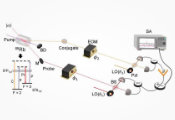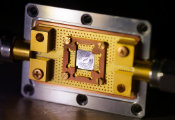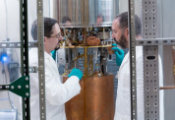Rigetti Granted Air Force Office of Scientific Research Award to Further Develop Breakthrough Chip Fabrication Technology
BERKELEY, Calif., April 28, 2025 -- Rigetti Computing, Inc. (“Rigetti” or the “Company”), a pioneer in full-stack quantum-classical computing, announced today that it was granted an Air Force Office of Scientific Research award to further develop its breakthrough chip fabrication technology, Alternating-Bias Assisted Annealing (ABAA). The $5.48 million Rigetti-led consortium, including Iowa State University, the Royal Melbourne Institute of Technology, the University of Connecticut, and Lawrence Livermore National Laboratory (LLNL), aims to develop a detailed understanding of how ABAA impacts the chip on a microscopic level — which will shed light on defects in superconducting qubits and open new avenues for understanding and mitigating them.
Addressing defects in superconducting qubits is a fundamental challenge in building large-scale fault-tolerant quantum computers. Last year, Rigetti introduced ABAA which entails applying a series of alternating low-voltage pulses at room temperature to the oxide barrier of the Josephson junction, a critical part of Rigetti’s superconducting qubits. Rigetti researchers discovered that this technique enables qubit frequencies to be precisely targeted prior to chip packaging. This improves the fidelity of two-qubit gates and the scalability of the technology. Unlike more complicated solutions that address the problem of tuning frequency, which often require laser trimming of the chip, ABAA is a simple and scalable process that only requires sending pulses of voltage to the chip.
Rigetti devices that have been manufactured leveraging ABAA show a reduction in two-level systems (TLSs). TLSs are defects in a qubit’s material that impact qubit performance by pulling energy from the qubit or dephasing it. Ultimately, understanding the effects of ABAA on TLSs will lay the groundwork for scaling the fabrication of superconducting quantum devices and other applications that rely on amorphous materials in tunnel junctions and dielectrics.
“This project gives us access to the resources and expertise to unlock the full potential of ABAA and gain a foundational understanding of defects in superconducting qubits,” says Dr. Subodh Kulkarni, Rigetti CEO. “We already know that superconducting qubits have advantages in speed and scalability. Deepening our knowledge of superconducting qubit defects puts us in an even better position to scale our systems with improved performance.”
Rigetti continues to support the U.S. Government’s commitment to maintaining quantum computing leadership and advancing the field. Rigetti was recently selected to participate in DARPA’s Quantum Benchmarking Initiative, which aims to determine if any approach to quantum computing can achieve utility-scale operation by 2033.




































